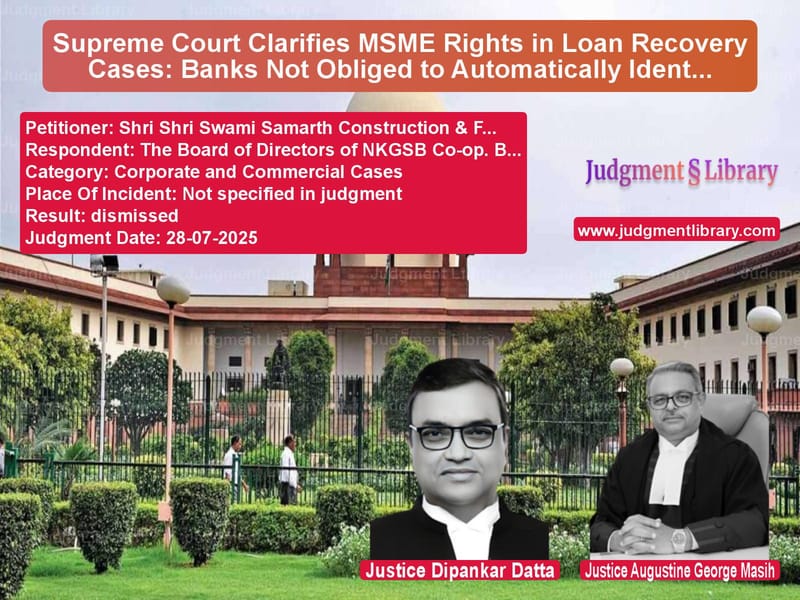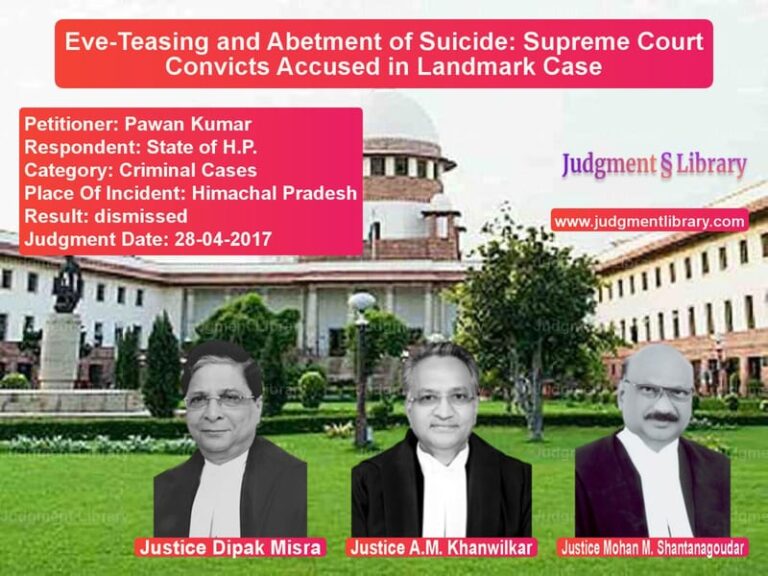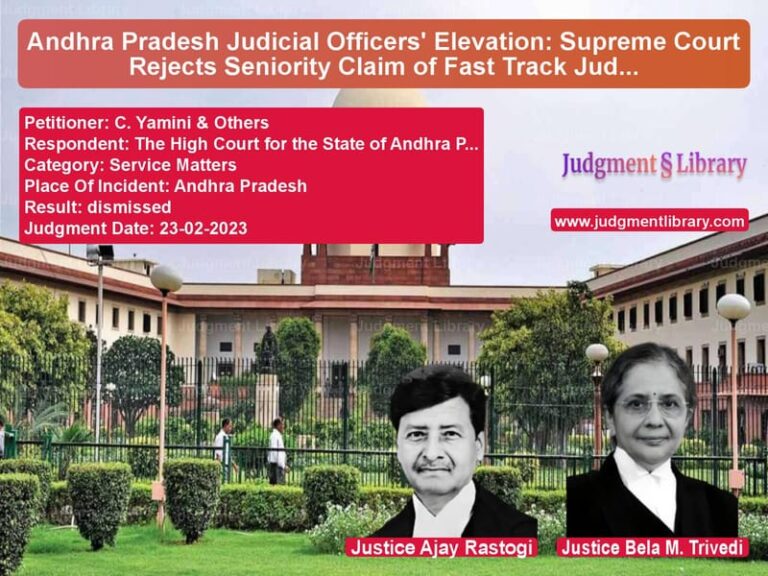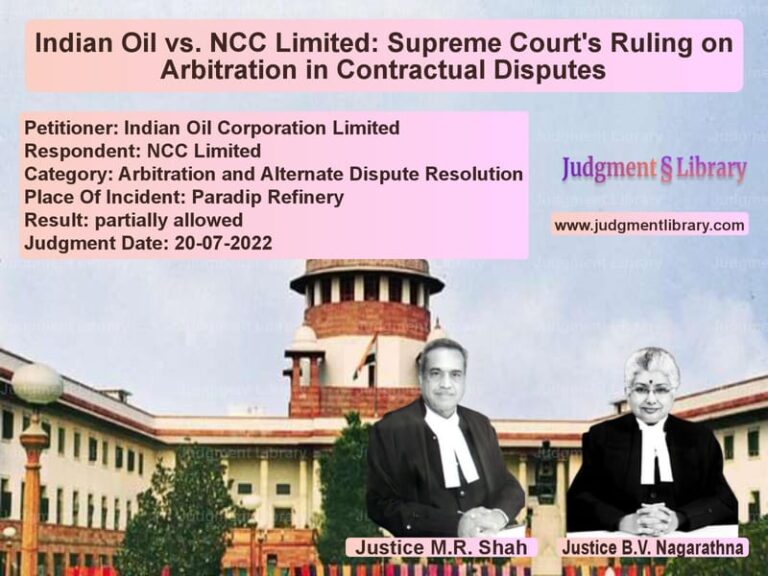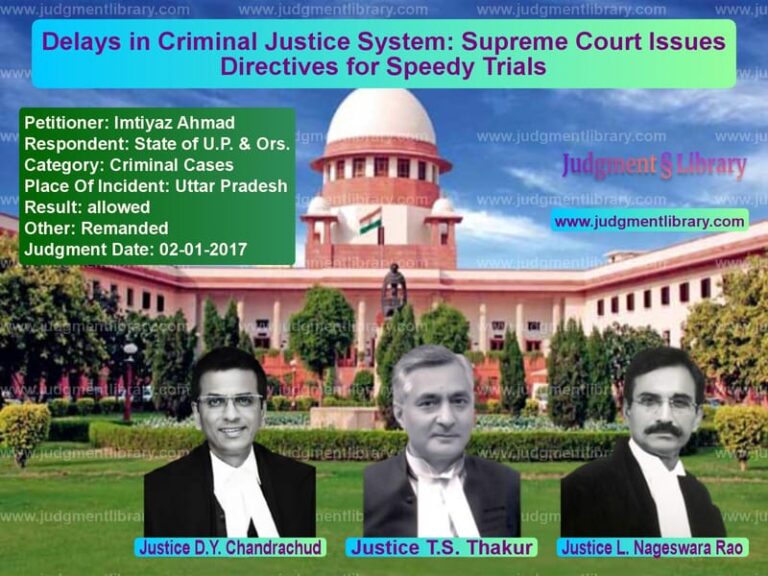Supreme Court Clarifies MSME Rights in Loan Recovery Cases: Banks Not Obliged to Automatically Identify Stressed Accounts
In a significant judgment that clarifies the rights and responsibilities of Micro, Small and Medium Enterprises (MSMEs) facing loan recovery actions, the Supreme Court has dismissed a writ petition filed by Shri Shri Swami Samarth Construction & Finance Solution against NKGSB Co-operative Bank Ltd. The case centered around whether banks are automatically obliged to identify “incipient stress” in MSME accounts before classifying them as non-performing assets (NPAs) and initiating recovery proceedings under the SARFAESI Act.
The dispute began when the petitioner enterprise, registered under the MSME Development Act, 2006, failed to repay its loan to NKGSB Co-operative Bank. The bank classified the account as a non-performing asset and issued a demand notice under Section 13(2) of the SARFAESI Act on May 13, 2024, giving the enterprise 60 days to repay the dues. When the petitioner failed to comply, the bank approached the relevant Magistrate under Section 14 of the SARFAESI Act, and a Court Commissioner was appointed on April 3, 2025. It was only at this advanced stage of the recovery process, after the Court Commissioner communicated the order to the petitioner on June 18, 2025, that the enterprise approached the Supreme Court under Article 32 of the Constitution.
The Petitioner’s Arguments
Mr. Nedumpara, the learned counsel for the petitioner enterprise, made several key arguments. He contended that “it was the obligation of the respondent no.2 to identify ‘incipient stress’ in the loan account of the petitioning enterprise but it did not so identify prior to classifying the loan account as NPA which, according to him, is wholly illegal.” He further argued that “the Notification is binding on the lending banks/secured creditors under the SARFAESI Act and, therefore, any measure taken under the SARFAESI Act without complying with the terms of the FRAMEWORK against a micro, small or medium enterprise would amount to an act in excess of jurisdiction.”
The counsel also emphasized that “such Notification/FRAMEWORK does not mandatorily require an MSME to notify the lending bank/secured creditor first that the MSME wishes to have incipient stress in its account identified; therefore, any defence that the MSME did not voluntarily initiate proceedings ought not to be allowed to be raised.” He relied on the decision in Pro Knits v. Canara Bank to support his submissions and prayed for admission of the writ petition and grant of ad-interim relief against the respondents.
The Supreme Court’s Analysis
The Supreme Court, however, was not persuaded by any of these arguments. The bench carefully analyzed the Framework for Revival and Rehabilitation of Micro, Small and Medium Enterprises issued by the Ministry of MSMEs on May 29, 2015. The Court noted that while the Framework begins with “Identification by Banks or Creditors,” it is immediately followed by “Identification by the Enterprise.”
The Court explained that “any MSME may choose to voluntarily initiate proceedings under the FRAMEWORK if it ‘reasonably apprehends failure of its business or its inability or likely inability to pay debts and before the accumulated losses of the enterprise equals to half or more of its entire net worth’.” The obligation of the MSME doesn’t end there – for initiation of proceedings under the Framework, the application has to be verified by an affidavit of an authorised person.
The Court rejected the petitioner’s interpretation, stating that “The way Mr. Nedumpara urges us to read the Notification and the terms of the FRAMEWORK, if accepted, would lead to the conclusion that every lending bank/secured creditor under the SARFAESI Act would be obliged to find out in every event of continuing default, likely to give rise to classification of the relevant account as NPA, whether the borrower is an MSME to which the FRAMEWORK applies, whether its business has failed or whether it is suffering from any disability to pay its debts.”
The bench observed that “This could not have been the intention behind introduction of the FRAMEWORK to aid the MSMEs which, for reasons personal to them, is unable to clear its debt and require revival and rehabilitation that the FRAMEWORK envisages.”
Harmonious Interpretation of the Framework
The Supreme Court provided a harmonious interpretation of the seemingly conflicting provisions. The Court held that “the terms of the FRAMEWORK do not prohibit the lending bank/secured creditor (assuming that it has no conscious knowledge that the defaulting borrower is an MSME) to classify the account of the defaulting MSME as NPA and to even issue the demand notice under Section 13(2) of the SARFAESI Act without such identification of incipient stress in the account of the defaulting borrower (MSME).”
However, the Court clarified the MSME’s rights at the subsequent stage: “upon receipt of the demand notice, if such borrower in its response under Section 13(3-A) of the SARFAESI Act asserts that it an MSME and claims the benefit of the FRAMEWORK citing reasons supported by an affidavit, the lending bank/secured creditor would then be mandatorily bound to look into such claim keeping further action under the SARFAESI Act in abeyance; and, should the claim be found to be worthy of acceptance within the framework of the FRAMEWORK, to act in terms thereof for securing revival and rehabilitation of the defaulting borrower.”
Critical Finding on Petitioner’s Conduct
The Court made a significant observation about the petitioner’s conduct: “As has been noted above, the petitioning enterprise does not seem to have ever claimed the benefit of the terms of the FRAMEWORK after the demand notice under Section 13(2) of the SARFAESI Act was issued. It is at the stage of compliance with an order passed by the relevant Magistrate under Section 14 of the SARFAESI Act that this writ petition has been presented before this Court claiming benefits of the FRAMEWORK.”
The bench didn’t mince words in assessing the petitioner’s intentions, stating “We find the bona fides of the petitioning enterprise to be suspect.”
Clarification on Pro Knits Judgment
The Court also clarified its earlier judgment in Pro Knits v. Canara Bank, noting that while that decision held that the Notification is binding on lending banks and secured creditors, it “also lays stress on the obligation of the MSMEs by holding that ‘it would be equally incumbent on the part of the MSMEs concerned to be vigilant enough to follow the process laid down under the said Framework, and bring to the notice of the Banks concerned, by producing authenticated and verifiable documents/material to show its eligibility to get the benefit of the said Framework’.”
The Court emphasized the caution in Pro Knits that “if such an Enterprise allows the entire process for enforcement of security interest under the SARFAESI Act to be over, or it having challenged such action of the bank/creditor concerned in the court of law/tribunal and having failed, such an Enterprise could not be permitted to misuse the process of law for thwarting the actions taken under the SARFAESI Act by raising the plea of being an MSME at a belated stage.”
Final Ruling and Alternative Remedy
The Supreme Court concluded that “No case for interference under Article 32 of the Constitution has been set up. There being no merit in the writ petition, the same is accordingly ordered to be dismissed.”
However, the Court provided a way forward for the petitioner by observing that “the petitioning enterprise will be at liberty to pursue its remedy under Section 17 of the SARFAESI Act, in accordance with law.”
This judgment establishes a clear framework for MSME-bank relationships in loan recovery scenarios. While protecting the rights of MSMEs to seek revival and rehabilitation under the 2015 Framework, it also emphasizes that MSMEs cannot remain passive and then challenge recovery actions at advanced stages. The ruling strikes a balance between protecting vulnerable small enterprises and ensuring that banks can effectively recover their dues, while clarifying that the primary responsibility to initiate rehabilitation proceedings rests with the MSME itself when it anticipates financial stress.
Petitioner Name: Shri Shri Swami Samarth Construction & Finance Solution & Anr..Respondent Name: The Board of Directors of NKGSB Co-op. Bank Ltd. & Ors..Judgment By: Justice Dipankar Datta, Justice Augustine George Masih.Place Of Incident: Not specified in judgment.Judgment Date: 28-07-2025.Result: dismissed.
Don’t miss out on the full details! Download the complete judgment in PDF format below and gain valuable insights instantly!
Download Judgment: shri-shri-swami-sama-vs-the-board-of-directo-supreme-court-of-india-judgment-dated-28-07-2025.pdf
Directly Download Judgment: Directly download this Judgment
See all petitions in Debt Recovery
See all petitions in Banking Regulations
See all petitions in Contract Disputes
See all petitions in Company Law
See all petitions in Corporate Compliance
See all petitions in Judgment by Dipankar Datta
See all petitions in Judgment by Augustine George Masih
See all petitions in dismissed
See all petitions in supreme court of India judgments July 2025
See all petitions in 2025 judgments
See all posts in Corporate and Commercial Cases Category
See all allowed petitions in Corporate and Commercial Cases Category
See all Dismissed petitions in Corporate and Commercial Cases Category
See all partially allowed petitions in Corporate and Commercial Cases Category

